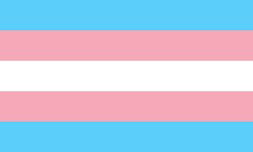Transgender Day of Remembrance
Monday 20th November is Transgender Day of Remembrance (TDoR), marking the end of Transgender Awareness Week (13 - 20th November annually). The annual observance honours the memory of transgender people who have lost their lives to anti-transgender violence in the past year. To mark this observance, the Transgender flag will be flown outside St Paul's, and Student Central and Oastler Building will also be lit white, pink, and blue, to reflect the Transgender flag colours.

"Transgender Day of Remembrance seeks to highlight the losses we face due to anti-transgender bigotry and violence. I am no stranger to the need to fight for our rights, and the right to simply exist is first and foremost. With so many seeking to erase transgender people – sometimes in the most brutal ways possible – it is vitally important that those we lose are remembered, and that we continue to fight for justice."
– Transgender Day of Remembrance founder, Gwendolyn Ann Smith
The importance of Transgender Day of Remembrance, and raising awareness of the transgender community, is echoed in our everyday lives. In 2023, hate crimes against transgender people hit a record high in England and Wales. Transgender issues have been heavily discussed in the media and politics in the last year, and research suggests that 80% of articles written about transgender people between 2015-2022 were negative - it's more important than ever to show up as allies to the transgender community.
Event: Vigil on Campus - Monday 20th November, 2:00-3:00pm
Join the LGBT+ Student Network and members of the LGBTQI+ Staff Equality Network for a Transgender Day of Remembrance Vigil from 2:00pm-3:00pm in the Community Hall (JCG/05) in the Jo Cox More in Common Building. The event will include speeches from the LGBT+ Student Network members about what the day means to them.
How can I be an ally to trans people?
- Pronouns: as well as respecting others' pronoun preferences, you could try introducing yourself using your name and pronouns - this normalises the practice and helps trans people to feel less isolated in doing so.
For a quick win, add your pronouns to your email signature! This shows colleagues and students immediately that you are an LGBTQI+ ally. Many social media sites now give you the option to add pronouns to your profile, including LinkedIn. - Use inclusive language: for example, you can try to use 'partner' or 'spouse' instead of gendered terms like 'husband' or 'wife'. These terms determine a relationship without including gender, meaning they are appropriate for everyone, and don't assume someone's gender identity or sexual orientation.
- Challenge transphobic rhetoric: it can feel uncomfortable to challenge transphobic remarks, but doing so takes the responsibility away from trans people and demonstrates your allyship. Most people are open to being corrected; speaking to someone in a non-confrontational, calm space to can make a huge difference.
Equally, allow yourself to be open to being corrected. 99% of people aren't trans and therefore can't relate fully to the experiences of trans people, which means we may make mistakes. It's okay to make a mistake - the most important thing to do is listen to the authentic voice, not dwell on your mistake, and move on. - Educate yourself: educating yourself and listening to trans voices can be as easy as following new accounts on social media, watching a new show on Netflix, or reading books written by trans people! Here are some suggestions:
Social Media:
@pinknews (LGBTQI+ news)
@mermaids_gender (charity supporting trans, non-binary and gender diverse children, young people and families)
Book:
The Transgender Issue - Shon Faye
Best-selling book by LGBTQI+ writer Shon Faye, reclaiming the idea of a 'transgender issue', exploring what it's like to be trans in a transphobic society and addressing the culture war of modern Britain. Shon also has a podcast, 'Call Me Mother', where she talks with LGBTQI+ trailblazers, aiming to deepen our understandings of the queer experience.
Television:
Sex Education - Netflix
Season 4 of Sex Education made television history with its authentic trans+ representation this year. It explored accurate, true-to-life representations of the transgender experience for young people, consulting with the trans actors starring in the series and charities such as Gendered Intelligence while developing storylines. As well as having trans+ representation, Sex Education also explores social, racial, religious, and gendered diversities in its various storylines, providing a space for the exploration of various intersectional identities.
Trans Inclusion and Allyship at the University
The University and LGBTQI+ Network are continually working toward progressing trans inclusion in the workplace. In 2023 the University achieved a prestigious Silver Award from Stonewall, ranking within the Top 100 Employers, a list which recognises exceptional employers who are committed to supporting their LGBTQ+ staff.
Below are a selection of trans inclusive policies, guidance, and resources from the University:
- Trans Equality Policy Statement
- Trans Equality Staff Guidance
- Gender-Neutral Toilets Provision
- Glossary of Terms
- Being Brave with Language: Gender Identity and Sexual Orientation
- Pronouns Guidance: what are they and why is it important?
LGBTQI+ Staff Equality Network
Did you know we also have an active LGTBQI+ Staff Equality Network?
The network meets termly each academic year, and helps coordinate a calendar of events across the year including TDoR, World AIDS Day, LGBT History Month, and Pride Month. The Network is open to any member of staff identifying as LGBTQI+, and regularly organises events which are open to allies as well as all staff and students. The Network is also inclusive of marginalised or underrepresented groups within the LGBTQI+ community, and seeks to support and platform these voices wherever possible.
Our Staff Networks provide a safe, open space for staff to connect, access peer support, and provides a mechanism for feedback to the University on a range of topics, including draft policy and guidance. To join or find out more, email Chair Carson McCombe or lgbt@hud.ac.uk.
